The Metals Company (TMC) - Battery Metals Shortage Solved?
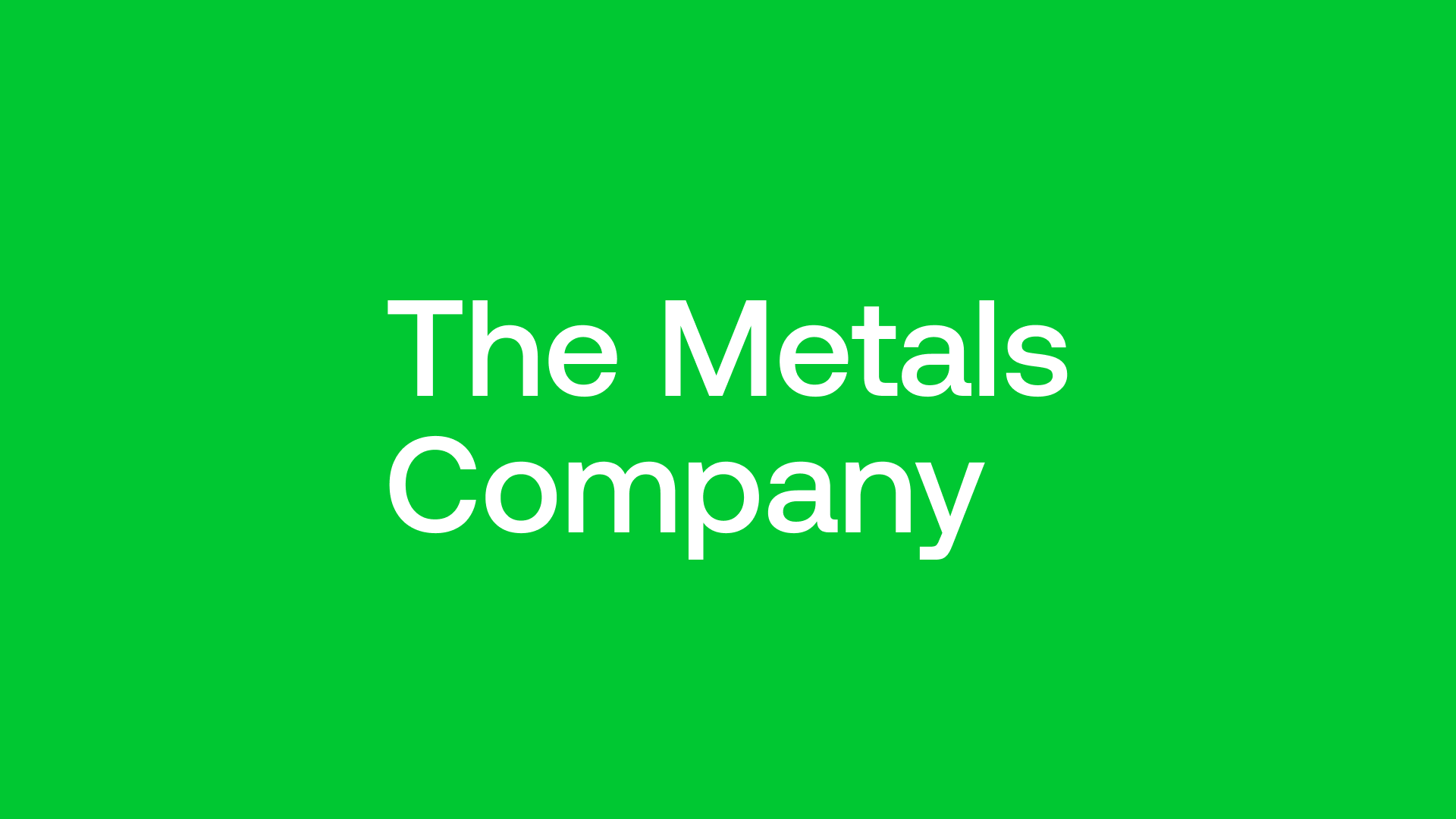
Interview with Gerard Barron, CEO of The Metals Company
The Metals Company (formerly DeepGreen) is a Canadian company that is enabling the battery-powered shift to electric vehicles with the lightest planetary touch. The company produces metals from polymetallic rocks to power electric vehicles. The company's team features scientists, environmentalists, engineers, architects, and business leaders working collectively against the future challenges of climate change.
Matt Gordon caught up with Gerard Baron, Chairman, and CEO, The Metals Company. Gerard is dedicated to helping humanity wean off fossil fuels and transition towards a circular resource economy. He is an entrepreneur with a strong track record of building global companies in battery technology, media, and future-oriented resource development both as a Chief Executive and a strategic investor. He has been involved with the strategic development and financing of DeepGreen since 2011. He was appointed as CEO in 2017.
Company Overview
The Metals Company was founded in 2021 through the merger of DeepGreen and the Sustainable Opportunities Acquisition Corporation (NYSE: SOAC) to scale its nodule collecting and onshore processing systems. The company is headquartered in Vancouver, Canada. It is listed on the National Association of Securities Dealers Automated Quotations (NASDAQ: TMC).
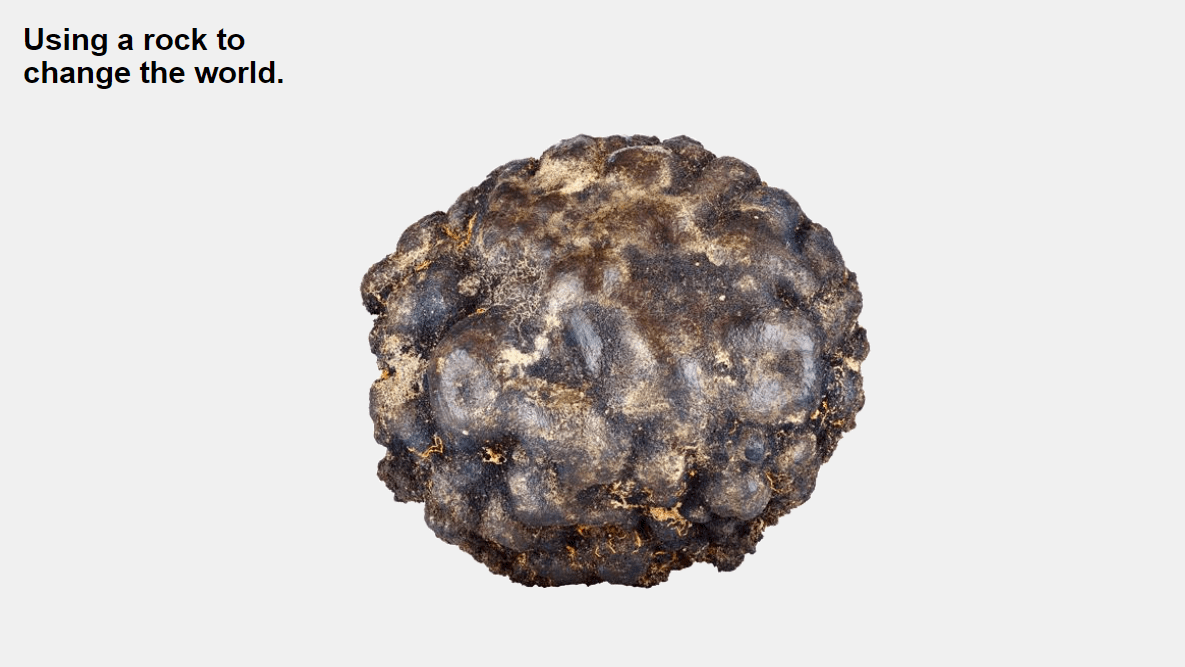
The Metals Company is opening up a new supply of battery metals in the form of polymetallic nodules. These nodules are present in great abundance within an ocean patch called the Clarion-Clipperton Zone. These nodules are present on the surface of the ocean bed and contain base metals that are needed for electrifying the company's energy systems.
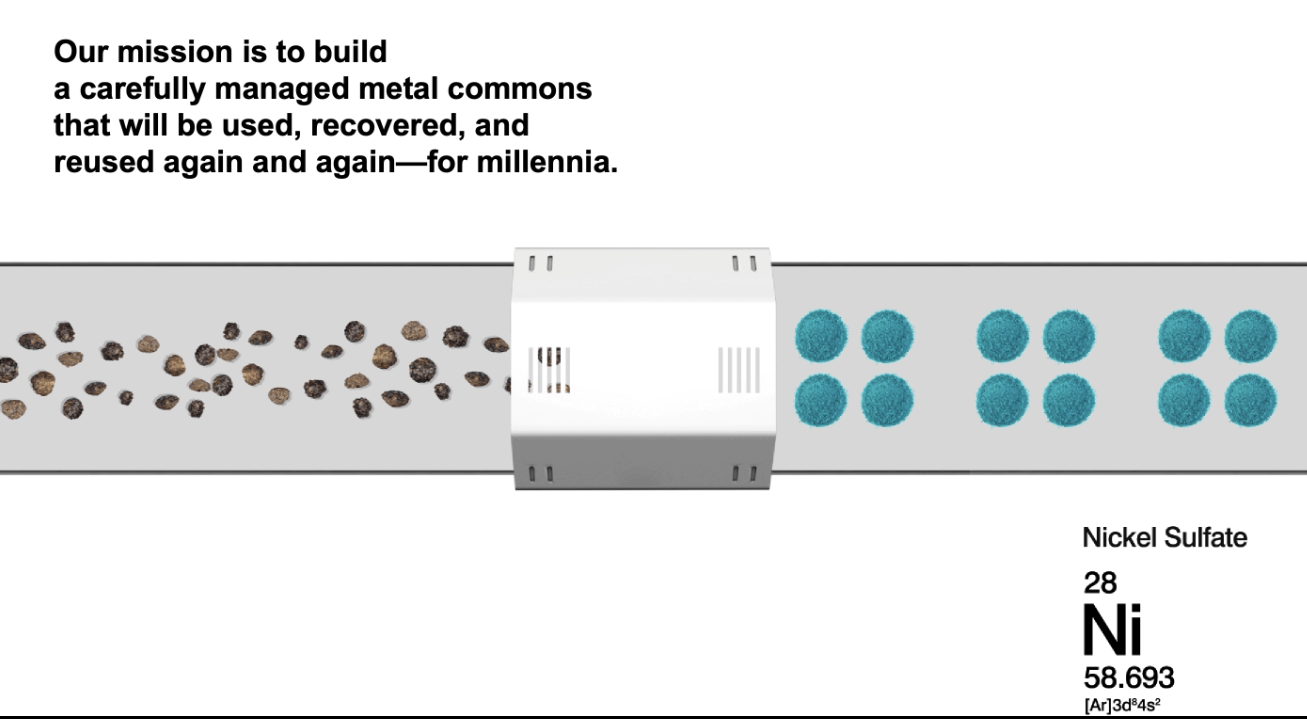
The Battery Metals Market
As the world transitions from a reliance on fossil fuels towards a new economy of electric cars, renewable power, and industrialization, the global demand for metals continues to rise. To reduce the impact of climate change, the world needs to move towards a circular economy through future recycling and reusing.
Currently, China is a leading supplier of battery metals globally. In fact, 90% of every ton of cobalt and 60% of every ton of nickel end up in China. As more companies look to develop gigafactories and transition from manufacturing gas-powered vehicles to electric, the local supply of these metals is becoming crucial.
For the past few decades, the US market has been working towards energy independence. The Metal Company's facility is located 1,000 miles off USA's west coast which can aid the North American market to gain a local mineral supply. The company is looking to procure metals in a way that has the least impact on the environment and societies. 50% of the company's revenue comes from nickel.
It has been observed that the metal grades on land are declining globally. Producers are looking for alternative ways to source this metal, such as nickel laterite mining that carries an enormous environmental impact. Western car companies are looking towards this extraction process as a medium-term strategy, however, the end result is an EV (electric vehicle) that is highly carbon-intensive to manufacture.
The Metals Company is looking at metal resources through a lifecycle analysis. This is to ensure that its extraction process does not harm the surrounding ecosystem and biodiversity. The company's major resource is located within the Abyssal Zone that is covered by 4,000m of water. The analysis takes into account the full lifecycle perspective of the region. This enables the company to reduce the carbon-dioxide emissions by 90% along with eliminating waste and tailings. This also negates the need to relocate communities, a common side effect of land-based mining operations.

Cash Position
The Metals Company merged with SOAC in March 2021 and announced the raise of a pipe, leading to a capital raise of $330M. The originally planned equity raise was $200M which was upsized due to growing demands. However, 2 pipe investors defaulted on funding leading to a reduction in raised capital. Due to this situation, the company's share price saw a dip in the market.
The equity raised by the company offers it the flexibility to fund its off-shore pilot mining project and on-shore pilot processing work along with environmental impact studies as it moves from exploration into the exploitation phase.
The Metals Company has a 1.5Bn ton resource base. Its operation is 43-101 compliant and confirms the S-K 1300 reporting standard. The company has designated its NORI Area D to be developed first. It has moved from an inferred resource to indicated along with a part of the measured resource at the site.
A Seabed Operation
The Metals Company's operation is 2 dimensional in nature as it is located on the seafloor. The company has collected survey data along with photograph-based records that cover 180,000 square kilometers of the seafloor. Due to the nature of this operation, the company does not require drilling holes into the ground, saving costs, time, and the environment.
The company's resource is measured in kg of nodules/m². The nodule grades identified have demonstrated consistency over a significantly large area. This is due to the geology which leads to the formation of nodules. The nodules precipitate the metals present in the sediment and the seawater. Due to the fluid nature of water, the distribution of the feedstock is even.
The company is carrying out surveys and taking box core samples at regular intervals for this operation. The company got its resource report signed by AMC. To measure the resource, the company took box core samples with 10km intervals, which is a departure from the industry's standard. As per the survey data, the resource is even and consistent, offering easy identification being a seabed operation.
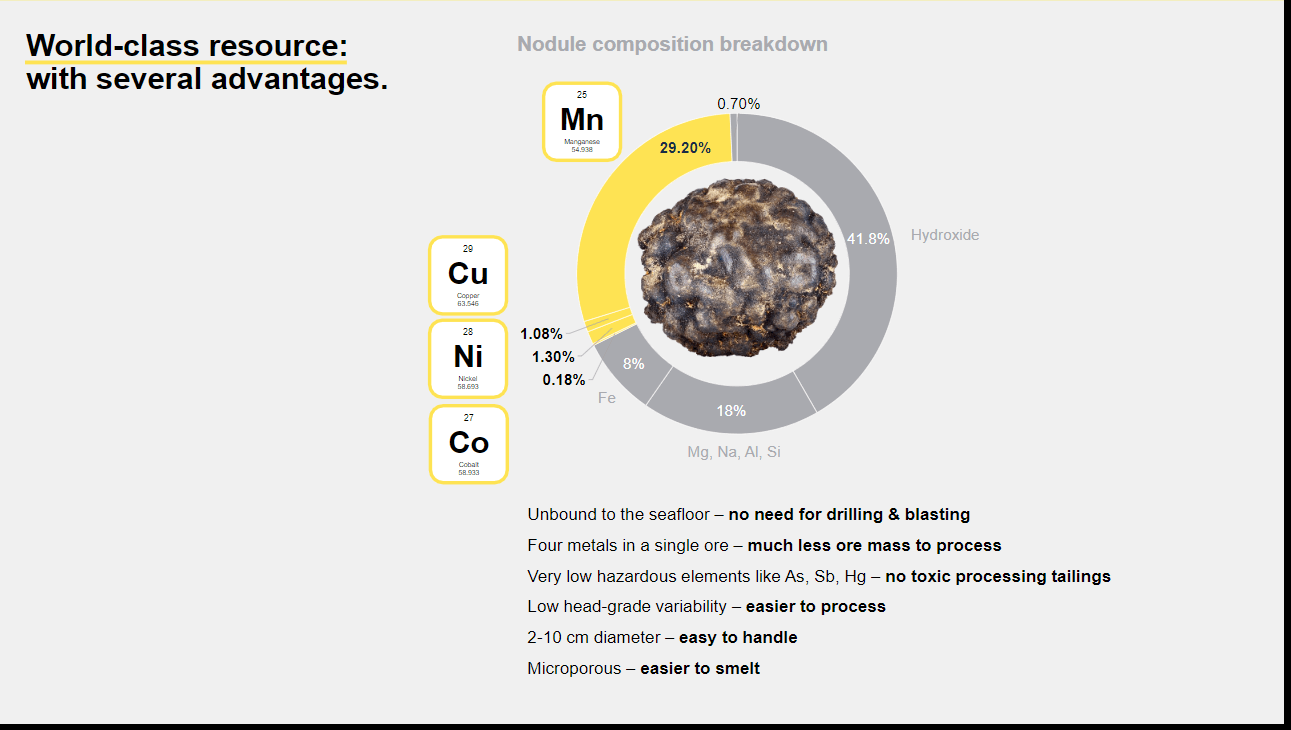
The Extraction Process
The Metals Company is utilizing a remote-operated harvester, a tracked vehicle that can move along the ocean floor and collect rocks. These rocks can then be separated from the sediment through an air riser. Following this, the air riser can pump the rocks into a production vessel located overhead, offloading the supply to a transporter that delivers the rocks on land. The Metals Company is looking to turn these rocks into metal through its pilot processing work. The company has partnered with Allseas to build an offshore system. The system is expected to be ready for operations over the licensed area by 2022.
Similar operations were carried out by oil and gas companies including BP, Shell, Mitsubishi, Sumitomo, and Lockheed Martin 50 years ago where collector systems were built to gather rocks 4,000m below sea level.
The operations weren't executed to completion due to a lack of a regulatory framework. Over the years, the UNCLOS (United Nations Convention on the Law of the Sea) was established in 1982 while the International Seabed Authority was established in 1994. In the past 50 years, there has been a significant advancement in extraction technology.
On July 9, 2021, one of the company's sponsor states exercised sovereign rights with a 2-year trigger, providing certainty around the operation timeline. This timeline dictates that the regulator must finalize any outstanding exploitation code allowing the company to submit its application for consideration and approval.
The Metals Company is currently building the harvester and has plans to visit the fabrication site next week. The company's partner Allseas acquired a Samsung 10000 drillship, an asset valued at $700M a decade ago for low 10s of millions of dollars. This drillship features a moon pool, a riser, significant power, and storage capacity.
The company's team has plans to visit the first production vessel that is currently on dry dock. This vessel is planned for pilot trials in 2022. The company anticipates that this will be its first production vessel in 2024.
The Pilot Program
The Metals Company carried out successful trials for its harvester earlier this year. Tests were carried out at Allseas' research facility in Delft, Holland along with CCZ sampling work through a Belgium-based contractor.
The Metals Company has done extensive research on these harvesters which are commonly found in Europe. The company representatives also made a visit to Chinaman Metals' pilot processing facility in Changsha 2.5 years back. This company has over 2 decades of experience processing the same nodules, leading to a better understanding of the operation and the harvesting process.
The Metals Company is looking to recover the metals from nodules through a melting process This process places the nodules in a kiln, a type of electric furnace that produces an alloy material comprising of nickel, copper, cobalt, and manganese silicate, a direct replacement of manganese ore. This resulting alloy is an attractive product as it features low levels of iron, making it efficient and desirable for steel production.
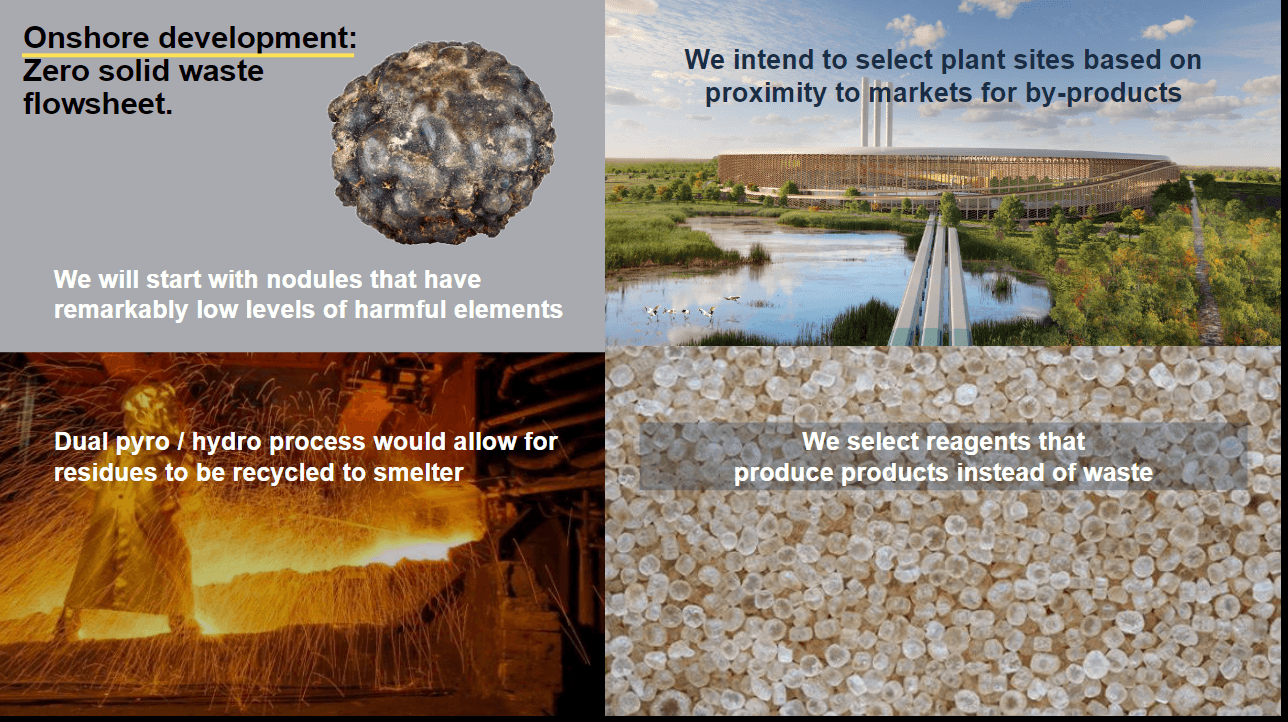
Project Economics
The company has been carrying out the pilot processing work for the onshore operations with companies including Ethos Schmidt, and XBS that have significant expertise in material handling. This has enabled the company to have a strong idea of the project CapEx (Capital Expenditure) and operating costs for onshore operations. The company is also working on its hydrometallurgical pilot processing operation which is scheduled for completion within the next 6 months.
The Metals Company is looking to convert the alloy material into matte, an end product higher in concentration that is easier to ship. This matte material can be converted to either nickel sulphate or nickel powder.
The offshore side of the operations is being carried out with Allseas, a company with significant expertise within this environment. The offshore industry is well established, determining the project economics is simpler.
As the company's operation involves the collection of nodules instead of drilling undersea holes, it facilitates a significantly low-cost operation. The company can collect the nodules and ship them to an onshore processing facility across the globe for under $100.
The high grade of nickel, copper, cobalt, and manganese in the alloy makes it a highly profitable operation. The finished product accounts for 32% metal content with 1.3%-1.4% nickel or 3.2% collective metal equivalent. The company's PEA (Preliminary Economic Assessment) was signed off by independent experts, providing strong guidance on project costs.

Government Sponsorship
The Metals Company has received sponsorship and licensing through a subsidiary for its NORI-D operation. It also has a sponsorship agreement with the Republic of Nauru. The company will pay a royalty to Nauru, which could positively impact its GDP by up to 50%.
The company will also pay a larger royalty to UNCLOS and the International Seabed Authority, effectively covering the cost of the regulatory framework.

ESG Initiatives
The company is looking to distribute the excess royalties to developing countries. This can be executed by locating facilities in areas near a deepwater port with a cheap and renewable electricity supply, fiscal stability, flexibility, and tax-friendly norms.
The company considers its asset as a common heritage for humankind due to its presence in international waters. The company has Nauru and the Kingdom of Tonga as sponsorship partners. These nations have the least impact on climate change, yet are most impacted by rising sea levels. These sponsorships and royalties will help provide the local community with training, employment, and a way to participate in the economics of the project. The company is looking to publish its first impact report by the end of 2021.

To find out more, go to the The Metals Company Website
Analyst's Notes




Subscribe to Our Channel
Stay Informed













